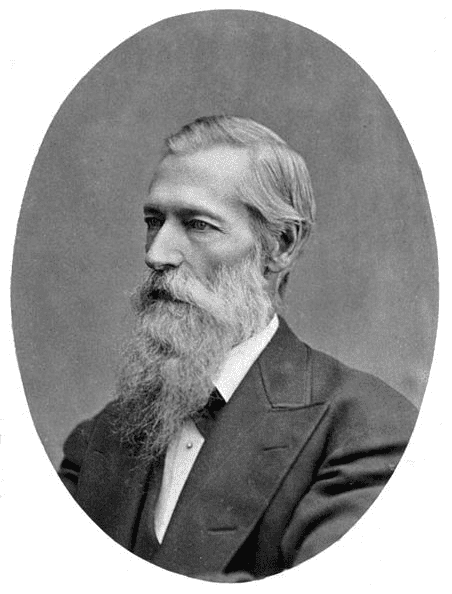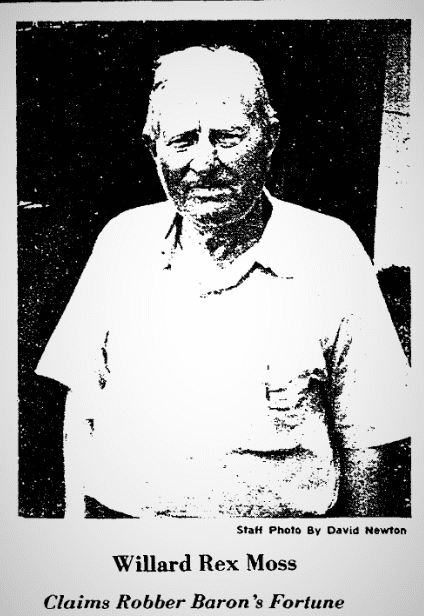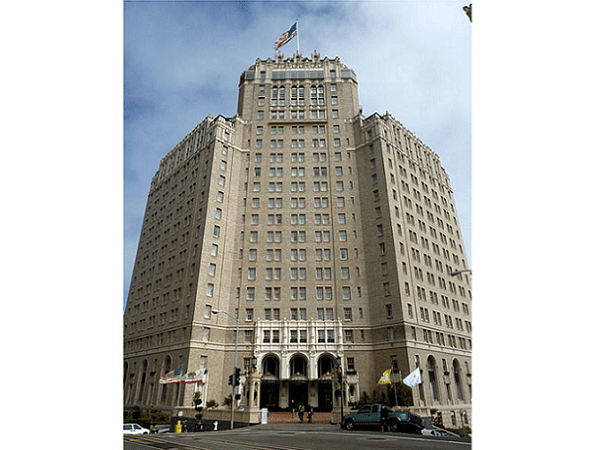Introduction: In this article, Melissa Davenport Berry continues the story of the people affected by the huge fortune left by railroad magnate Mark Hopkins, focusing on yet another scam to get some of the riches. Melissa is a genealogist who has a website, americana-archives.com, and a Facebook group, New England Family Genealogy and History.
Note: Melissa is writing a series of articles about the people affected by – and the mad scramble for – the huge fortune left behind by Mark Hopkins when he died without a will or heir in 1878. This is the eighth article in that series; links to the first seven installments can be found at the end of this article.
California railroad magnate Mark Hopkins died in 1878 without a will or designated heir – and the huge fortune he left behind was under siege for more than a century by scammers claiming a connection to the man, and therefore his money.

I’ve been digging into this saga, and I’ve found that GenealogyBank’s Historical Newspaper Archives are loaded with stories and records to trace the courtroom dramas and families on this treasure hunt.
In the 1960s and 1970s, one of the main schemes to get the Hopkins money came out of Virginia.
The claimants who contested the Hopkins fortune were part of an organized group that lured potential heirs to join with them to file in probate court. It was part of a con game that hustled the hopeful heirs to invest their own money, which supposedly would secure them a portion of the estate and the Hopkins fortune. The investors were sold stocks, or “contracts,” which promised them a hefty return.
There was always a front runner collecting. One fellow, W. R. Moss of Martinsville, Virginia, was one of the “confidence men” who lured in hundreds of hopeful heirs and sold contracts which listed Mark Hopkins’ real estate holdings, stocks, and millions in cash.

Among the property holdings that Moss listed in petition against the estate of Mark Hopkins was the Mark Hopkins Hotel in San Francisco, California. The hotel was never owned by Mark Hopkins (in fact, it was built after he died), but Moss asserted that the land the hotel stands on was owned by Hopkins.
In 1978 David Newton, staff writer for the Greensboro Daily News, paid a visit to Moss in Martinsville to hear his story. It was clear from this interview that Moss was fixed on taking the reins of the Mark Hopkins Hotel – but while he waited, he ran his own little enterprise: the Moss Hotel, located on 10 Moss Street in Martinsville. Newton noted the “two-story decaying relic had boarding house written all over it.”
Moss told Newton he was in negotiations with the Mark Hopkins Hotel to charge it $75,000 a month for rent – a huge step up from the $2.50 a night he collected from his guests at the Moss Hotel. Newton investigated Moss’ claim and interviewed Sandor Seangl, the Mark Hopkins Hotel manager. Seangl wasn’t fazed by Moss’ claim.
“Seangl, in a telephone interview, said Moss claimed ownership of the hotel and was eventually escorted from the premises. ‘It’s nothing new,’ said Seangl. ‘We have five to six people a year coming in claiming to own the hotel. We have a set procedure for dealing with them.’”
Moss told Newton he was an expert in several subjects, and earned money by many means: farmer, bookkeeper, orator, brick mason, carpenter. Moss had less than 20 months of formal education and learned to read at the silent movies.
Hold on there is much more! Here is what Newton reported about Moss:
“He says he ate with Franklin Roosevelt, knows all the Hollywood stars of the 1950’s and talked to Gene Autry on the telephone just last week.
“He has conversed with Gen. George S. Patton and during World War II was hired as a ‘double secret agent’ for the War Department. I talked with all the five star and 10 star generals. They knew me, I knew them… all the stars.
“At the same interview where he was hired as a ‘double secret agent’ the interviewing colonel told a colleague, ‘This is the only man I’ve ever found that knows everything.’
“One of those things Moss knows is that ‘Hitler never died in Germany. Have you ever been to Hitler’s farm in Colorado?’”
So how did a man like Moss win over so many hopeful heirs? That is a question worth a million in itself!
He used a similar scheme devised by a Tar Heel clan in North Carolina who tried to lay claim to the Hopkins fortune in the 1920s (see Mad Scramble to Claim Mark Hopkins’ Riches: A ‘New Gold Rush’).
Moss’ claim was that anyone related to Mason Moss, father of Mary Anne Millie Moss – who supposedly ran away with Mark Hopkins to California in 1850 before he made his millions – was an heir to the $300 million estate. He asserted that Millie was the common-law wife of Hopkins, and his own great-great aunt.
In 1967 Willard gathered over 400 Moss family tree members he tracked down from his “genealogy research.” He enticed them with his so-called credentials as an expert researcher and genealogist and convinced them they were entitled by law to the Mark Hopkins fortune.
Moss asserted that his records would stand up in the Supreme Court. He aligned his research reports with the Virginia Genealogical Society. He stated that he traveled a total of 13,789 miles to verify the family lineage tie to Mark Hopkins. He went to the National Archives in Washington, D.C., and several libraries. Moss declared the Hopkins estate would be turned over to the Moss tribe, but “we got to prove Millie and Mark shared a bed, wedded or not.”
Moss hooked many gullible members of his audience, receiving $500 and up for each family member. In exchange for the money Moss gave his investors a “contract” which guaranteed a percentage of the million-dollar Mark Hopkins estate. He told the hopeful heirs he needed the funds to cover legal and travel expenses. He said he had already lined up California attorneys who were eager to file a petition in probate court, but needed a $5,000 retainer.
However, after a few years of Moss not producing any concrete results, the Hopkins hopeful heirs grew impatient. In 1969 Mrs. H., a potential investor, called the Greensboro Record “Hot Line” and asked if the Moss project was a sound investment. The printed response was far from encouraging.
Moss eventually turned the gig over to another scammer sect and instead honed in on the Mark Hopkins Hotel claim – and we know from the news report above how that turned out. Moss passed away peacefully in Martinsville, Virginia, on Moss Street in 1980.
One interesting fact on W. R. Moss’ blood connections: his cousin John R. Still married Helen H. Kincaid, a long-term caregiver and employee of Mark Hopkins’ granddaughter, Lydia Kellogg Hopkins (see The Mysterious Death of Heiress Lydia Kellogg Hopkins, Part II).
Still and Kincaid were part of another scam where Mark Hopkins stock contracts were sold. Kincaid and others were arrested for fraud by the Securities and Exchange Commission in 1973. Some of Still’s family were present at Moss’ 1967 meeting.
I have not finished yet with all the genealogy, but there are no coincidences here. Stay tuned for more Hopkins sagas and stories!
Explore over 330 years of newspapers and historical records in GenealogyBank. Discover your family story! Start a 7-Day Free Trial
Genealogy:
- Willard Rex Moss (1895-1980), son of Thomas Edward Moss (1873-1937) and Julia W. Smith (1874-1958), grandson of Thomas Edward Moss (1848-1873).
- R. Moss married Susie Jane Spencer (1897-1976). They had one daughter, Alma Allean Moss (1928-2007), married to Curtis William Isley (1928-1977). Willard Rex and his wife are buried at Harden Spencer Cemetery in Patrick Springs, Patrick County, Virginia.
- Siblings of Willard Rex Moss:
- Mary Moss (1897-1972), married to Nathaniel Thomas Oakes (1901-1965).
- James Thomas “Ralph” Moss (1901-1991), married to Queenie Clark (1901-1997).
- Charlie Roland Moss (1904-1908), married to Gladys Lucille Edwards (1912-2011).
- Annie Lou Moss (1907-1987), married to 1st Junius Clyde McElroy (1909-1979), 2nd Felix Berkley Allen (1895-1959), and 3rd Marshall Cobb Dailey (1904-1987).
- Margaret Moss (1913-2001), married to Russell L. Liles (1909-1978).
- John Robert Still (1921-1993), son of John Robert Still (1873-1953) and Deborah Brame (1849-1926), grandson of John James Still Jr. (1849-1926) and Prudence Moss (1846-1945), daughter of Robert Moss (1815-1870) and Jane Collins (1816-1870).
- Connection between Willard Rex and John R. Still: Robert Moss and Jane Collins; children Prudence Ann Moss and Thomas Edward Moss.
- Beulah Mary Moss Brown (1899-1989), daughter of John Robert Moss (1871-1956) and Mary “Susan” Overby (1872-1946), married to Eugene Brown (1894-1964). Their daughter Beulah Mae Brown (1923-2018) married David Keen Collins.
- Helen Harrison Kincaid Still (1908-2000), daughter of Frank Edson Harrison (1883-1939) and Nina Pearl Kerr (1883-1957), married to Robert John Still (1921-1993) in 1972. Prior to her marriage to Still, Helen married James Garrett Kincaid (1903-1985), son of Millard Fillmore Kincaid (1860-1950) and Lucinda Martha Martin (1864-1948).
- Helen worked and lived on the estate “Hidden Acres” owned by Lydia Kellogg Hopkins (1887-1965), daughter of Timothy Nolan Hopkins (1859-1936) and Mary Kellogg Crittenden (1862-1941), granddaughter of Mary Sherwood (1818-1891) and railroad magnate Mark Hopkins (1813-1878).
- There is a Moss/Hopkins marriage as recorded in the Benjamin Hopkins Family Bible:
- Mary Ann Hopkins (1814-1857), daughter of Edward “Ned” Hopkins (1782-1859) and Hannah Crow (1782-1879), married to Amelius Mason Moss (1810-1884), son of William Hazelwood Moss (1775-1845) and Rebecca Robinson (1779-1859). I have not been able to verify yet. I have found that Amelius Mason Moss married Mary Pocahontas Yates.
Further Reading:
- InterContinental Mark Hopkins – A San Francisco Hotel
- SAN FRANCISCO — The Mark Hopkins Inter-Continental, one of this city’s Nob Hill grandame hotels, underwent a $50 million face-lift that will keep it in competition with its worthy rivals
- The Hopkins Bible Virginia, North Carolina and Georgia National Archives
Other Articles in This Series:
- Fake Wills & Forged Bibles Lay Claim to Mark Hopkins’ Huge Estate
- The Gilded Age Palace: What Mark Hopkins Bankrolled
- Mad Scramble to Claim Mark Hopkins’ Riches: A ‘New Gold Rush’
- Diary of Young Girl Recalls Gilded Age
- Pedigree, Pearls, and Pooches: The Hopkins Saga Continues
- The Mysterious Death of Heiress Lydia Kellogg Hopkins, Part I
- The Mysterious Death of Heiress Lydia Kellogg Hopkins, Part II
